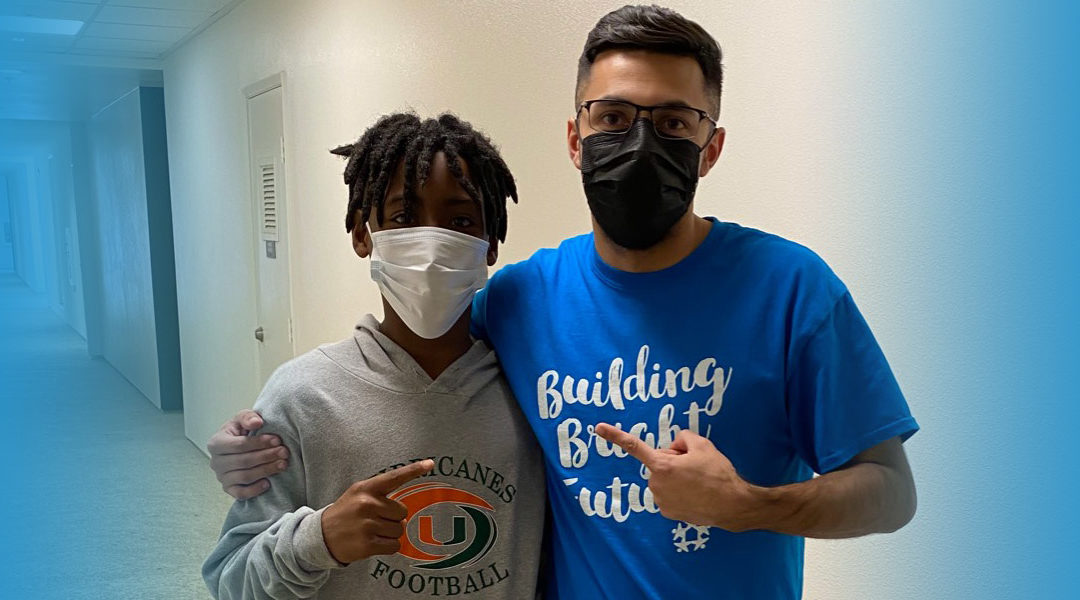Hope through Housing, in partnership with the City of Ontario, is piloting an exciting youth mentorship program at the new affordable housing community of Vista Verde, with remarkable success. The youth mentorship program, as well as Hope through Housing’s teen clubs, are led by young adult mentors, mostly AmeriCorps members and Master of Social Work candidates who are recent college graduates, offering a strong support system and create a safe space where children can develop their social, emotional, and academic skills.
“I know when I was a kid, I would have loved to have been in teen club, or just been in some type of guidance program or youth program,” Hope through Housing PromiseCorps member Dean Flores, a mentor at Vista Verde, said. “Of course, being brought up by a single mom, it was just hard to even get around or do much, you know?”
Dean, who grew up and still lives near Vista Verde, has noticed that many of the kids in his program also are being raised by single parents, or coming from difficult home environments. The free mentorship program is not only crucial because it provides adult supervision during the critical afterschool hours –Hope through Housing also, through individual support and group activities, teaches children skills that will help them manage their lives in a healthy and productive manner.
Dean is also harnessing his own unique background to support the young residents. A martial artist, trained in karate and taekwondo, Dean has begun leading basic martial arts classes, teaching valuable life lessons.
“Martial arts, really, for the most part, isn’t about fighting at all – it’s more than that. It builds confidence and discipline,” Dean said. “You kind of stick your chest out, have your shoulders back a little more, and you just kind of stand taller.”
Before entering the program, the children and their parents fill out a detailed survey that includes general info about the child, emergency contact information, and questions asking the child what their hobbies are, what they want to be when they grow up, and what they would like to get out of the teen club. Parents are also encouraged to share any special circumstances or needs of their children. This allows the mentors to get an early idea of each child’s strengths and areas for growth.
“Each kid is different in their own way, in their own unique way,” Dean said. “When we work with them, we know what’s presented to us, and how we can help them the best we can.”
Before Dean met Semaj, a sixth grader, his mom told him that her son was having trouble making friends at school, building confidence, and with his social and communication skills. Sometimes, his distracted behavior got him in trouble at school.
Dean immediately noticed that Semaj had a knack for martial arts. Already a football athlete, Semaj had impressive form and technique while engaging in Dean’s lessons. Dean also found that the two were able to connect easily through the discipline. The mentorship and martial arts training proved very helpful for Semaj. When football season was over, Semaj started showing up for every day of programming in the Vista Verde community room. Although Semaj had previously experienced some behavior problems, he began to make quick improvements.
“I told him, ‘We’re not perfect. We’re all far from perfect. And we all make mistakes,’” Dean said. “And I told him, ‘If you can acknowledge your mistakes, you know, it’ll take you way further than the people that aren’t honest with themselves. And you’ll have a better circle.”
Despite his young age, Semaj comprehended these big lessons – his mother let Dean know that her son was making lots of progress at school. Dean’s mentorship also has been having a similar effect on the other students. One day recently, a child’s mother came by the program to use the printer in the recreation room. She told Dean and his fellow mentor, Master in Social Work Intern Victoria Garcia, that her son had made a lot of progress after joining the program – Dean had personally noticed that he had started breaking out of his shell of shyness. Before, he had sat quietly and played with a fidget spinner. Now, he had stopped bringing his fidget spinner and was responding with excitement for each of the activities.
Dean said the mentorship work has been very impactful on his own life. Dean, who once experienced bullying at school, is now helping ensure that each child respects one another. He is proud to be “working within the community, and teaching kids the things that I’ve learned along the way.”

